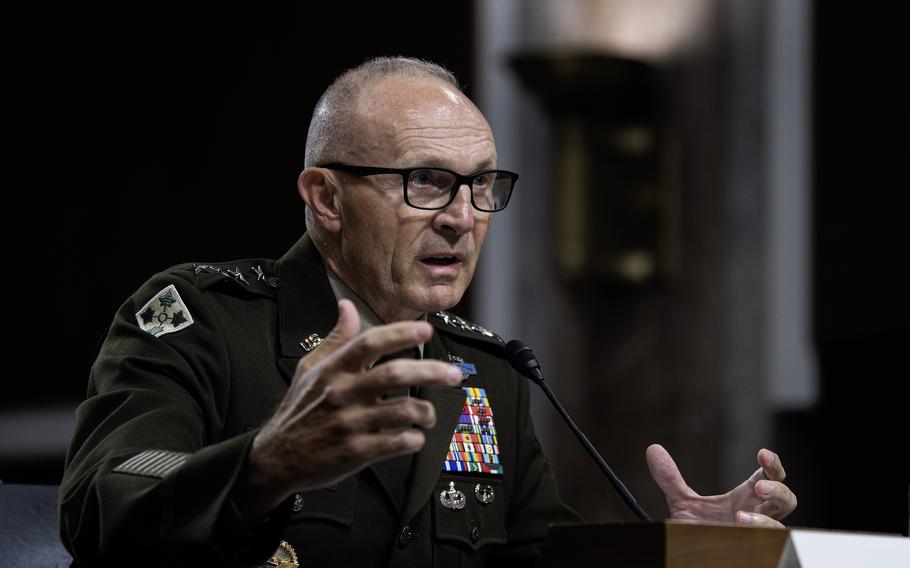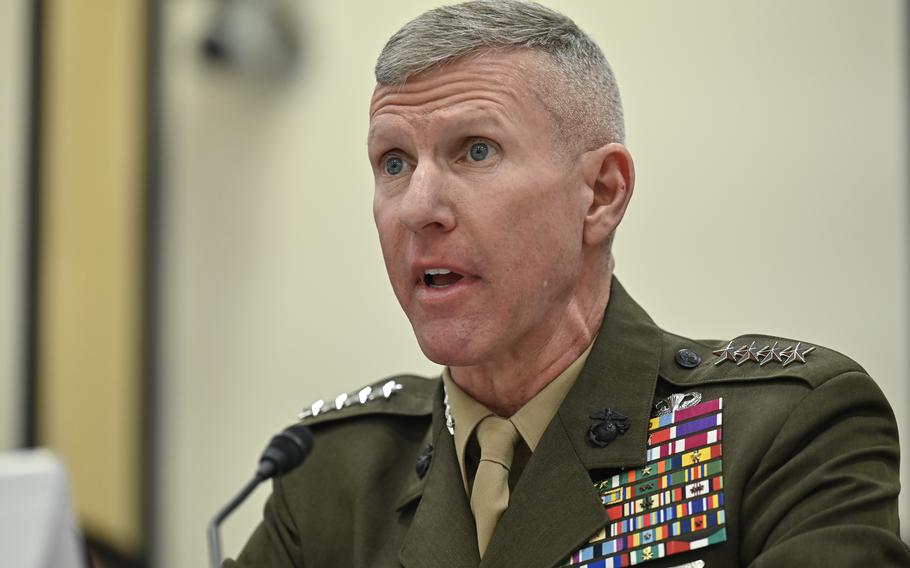
Army Gen. Randy George answers questions July 12, 2023, during a Senate Armed Services Committee hearing on Capitol Hill in Washington, D.C., to consider his nomination to be the next chief of staff of the Army. (Carlos Bongioanni/Stars and Stripes)
WASHINGTON — The Senate voted Thursday to confirm the Army chief of staff and is on track to approve the appointment of the Marine Corps commandant, filling key positions on the Joint Chiefs of Staff as Sen. Tommy Tuberville maintains his block on 300 other military nominees.
Army Gen. Randy George was approved in a 96-1 vote, with one Republican senator objecting. He had been simultaneously serving as the service’s vice chief of staff, a position that he has held since 2022, as well as the acting chief of staff since the August retirement of Gen. James McConville.
“I have full confidence that he will continue to modernize the Army and maintain our highly trained and lethal force to fight and win our nation’s wars,” said Sen. Joni Ernst, R-Iowa. “Gen. George is a hardworking public servant who knows the needs of our soldiers and their families.”
Marine Gen. Eric Smith also is performing dual roles as assistant commandant of the Marine Corps and acting commandant following the retirement of Gen. David Berger in July. He is set to be confirmed later Thursday afternoon.
George and Smith have been prevented from officially ascending to their services’ top posts by Tuberville’s monthslong objection to a routine Senate process for voting on general and flag officers in large batches.

Assistant Commandant of the Marine Corps Gen. Eric Smith testifies before the House Armed Services Committee on Readiness for the Marine Corps’ fiscal year 2024 budget request, in Washington, D.C., April 19, 2023. (Eric Dietrich/U.S. Air Force)
Tuberville, R-Ala., said Wednesday that his hold will remain in place as long as the Pentagon continues to give time off and travel reimbursement to service members who want to cross state lines to obtain an abortion or other reproductive health services.
The seven-month standoff forced Senate Majority Leader Chuck Schumer, D-N.Y., on Wednesday to put the most pressing nominees up for individual floor votes, starting with Air Force Gen. C.Q. Brown. Brown was confirmed as the next chairman of the Joint Chiefs of Staff on Wednesday night in an 83-11 vote with just 10 days left before Army Gen. Mark Milley, the current chairman, retires.
Schumer reversed his opposition to confirming individual nominees after Tuberville made moves this week to force a floor vote on Smith. Democrats had argued it was up to Republicans to pressure Tuberville to drop his hold and said voting individually on top-level nominees, as Tuberville and other Republicans had demanded, would politicize a typically uncontroversial process.
“We are disturbed … by Republicans’ interest in voting exclusively on a few select officers while hundreds of other officers and their families are punished,” said Sen. Jack Reed, D-R.I, chairman of the Senate Armed Services Committee. “Democrats pursued every opportunity we could before taking this route, and I hope Republicans understand the terrible message they are sending to the force.”
It would take the Senate 103 days to confirm each of the 319 officers affected by Tuberville’s hold, according to Sen. Amy Klobuchar, D-Minn.
Two additional picks for the Joint Chiefs are also caught up in the stalemate. Adm. Lisa Franchetti is nominated to become the first female naval operations chief and the first woman on the Joint Chiefs while Gen. David Allvin is awaiting confirmation for Air Force chief of staff. Franchetti has been serving in her nominated role in an acting capacity since August while also serving as vice chief of naval operations.
George, a veteran of the Gulf War and the wars in Afghanistan and Iraq, is taking the Army’s highest post after a decorated warfighting career. As a brigadier general in 2015, he helped spearhead the Army’s response to Russia’s first invasion of Ukraine by leading a new mission command overseeing soldiers on NATO’s eastern flank.
He previously worked as the senior military assistant to Defense Secretary Lloyd Austin and told senators during his confirmation hearing in July that he plans to promote the value of service to help the Army address its ongoing recruitment struggles.